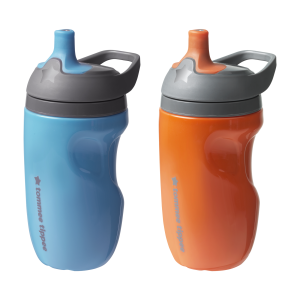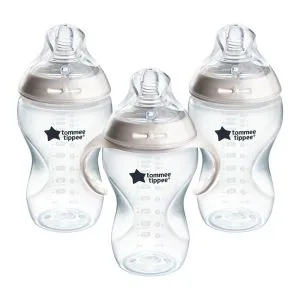As your baby begins their weaning journey, you can begin introducing them to cow’s milk, or plant-based alternatives.
From full fat vs. skimmed, to almond or oat milks for babies, we’ve created this super simple guide to answer the commonly asked questions about introducing milk to your child’s diet.
When can babies have cow’s milk?
Once they turn 12 months old, even if you’re still breastfeeding, you can start introducing your baby to full fat or whole cow's milk (or even pasteurised goat's and sheep's milk if you're feeling adventurous).
Although cow's milk can be used in cooking from 6 months on, it isn't suitable to drink before their first birthday. The high concentration of protein in milk is harder for your baby to process and can cause stress to their immature digestive systems.
You should avoid giving them too much milk at first, even if they’ve weaned off breastmilk (or formula) and are mainly drinking cow’s milk - you don’t want them to feel too full and start rejecting other foods.
We’d recommend giving your baby between 350ml to 400ml of cow’s milk per day (that’s roughly 2 cups of milk). This includes products that contain milk, such as yoghurts, fromage frais and cheese.
Semi-skimmed milk (1-2% fat) can be introduced from 2 years of age, but skimmed milk (less than 0.5% fat) isn't recommended until they're 5.
A small percentage of children are allergic to or intolerant of dairy and won’t be able to drink any cow’s milk. If you’re worried that your baby could be allergic to dairy, you should speak to a doctor or dietician about alternatives.
When can babies have plant-based milk?
If cow’s milk isn’t an option, unsweetened oat, almond and soy alternatives also form part of a healthy, balanced diet for your baby from 12 months and on. We wouldn’t advise giving them plant-based milks as a main drink unless under certain circumstances (e.g. a healthcare professional/dietician has recommended to do so).
Milk and dairy are important sources of nutrition for a growing baby, so if you’re planning on giving them plant-based milks instead, it’s best to discuss this with a GP or health visitor. You should also check labels and nutrition facts panels to see if your preferred milk alternative has been fortified with nutrients like vitamin D, calcium, and protein as these are important for your baby's development.
You shouldn’t give babies and young children under 5 years old rice drinks, as they contain high levels of arsenic. If your child has already had rice drinks, don’t worry. There’s no immediate risk to them, but it’s best to switch to another kind of milk.
Why is cow's milk not suitable as a drink for babies under 12 months?
Cow's milk doesn't contain the balance of nutrients that young infants and babies require in the first year of life. There isn’t enough iron, vitamin E or essential fatty acids for a young baby in cow's milk. It may also be too high in protein, sodium and potassium.
Can I continue to breastfeed if my baby now drinks cow's milk?
Once you've introduced cow's milk into your baby's diet, there's no reason to stop breastfeeding altogether if you and your baby are still happy to do so. Experts say that it's fine to continue breastfeeding after their 1st birthday – the World Health Organisation advises that babies are breastfeed for up to 2 years and beyond.









